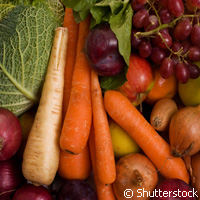New EU-funded project to tackle improving nutrition among those at risk of poverty
Today in Europe many nutritional foodstuffs remain a luxury commodity and are not affordable for everyone in society. In light of this, a new EU-funded project that hopes to tackle the resulting poverty-related nutritional problems has just got underway. CHANCE ('Low cost technologies and traditional ingredients for the production of affordable, nutritionally correct foods improving health in population groups at risk of poverty'), part of the Seventh Framework Programme's (FP7) 'Food, agriculture and fisheries, and biotechnology' Theme, aims to bring researchers and industry partners together to develop appealing, affordable and healthy food products that could prevent common nutritional problems among those vulnerable to poverty. Whilst healthy eating and nutritional advice has perhaps never been more accessible, those living on the poverty line rarely benefit - mostly due to the soaring costs of nutritious foods, such as organically produced vegetables. And while much attention is paid to the economical implications of living on the poverty line, this concern does not always extend to the effects poor economy has on nutrition-related ill health. A recent Eurostat survey set out the urgency of better understanding the barriers to healthy nutrition among the 81 million EU citizens currently living on the poverty line. Bad nutrition is directly linked with a greater risk of obesity and related problems such as diabetes and cardiovascular disease. The CHANCE consortium, made up of 17 partners from 8 European countries, plan to take a two-tiered approach by focusing on both exploring low-cost technologies and ingredients, and researching how education and awareness about healthy eating can be improved. The team plan to look at by-products rich in fibre resulting from the production of fruit juices and other derivatives from food processing. Coordinator of the CHANCE consortium, Professor Francesco Capozzi from the University of Bologna, comments on the project: 'In spite of the fact that our major diet-related diseases are more common in lower incomers at risk of poverty only limited efforts are made to develop healthier products in the lower price range. By exploring means to lower the production costs and increasing the knowledge about this particular group of consumers CHANCE will hopefully stimulate development of food products that can make a difference as well as make them available and attractive to people who really need them.' Statistics from Eurostat indicate that women and the elderly are two of the most vulnerable groups, and the CHANCE researchers want to work out what other groups are also most at risk of poverty. Then the team plan to delve deeper into the problem and find out what specific problems exist, such as inadequate intakes of the micronutrients iron and vitamin B12. The CHANCE team will also study what those living in poverty believe are the main barriers to healthy eating as well as talking to retailers, food and drink industry representatives and other actors in the food chain. This will hopefully help the researchers meet the eventual aim of developing healthy food products that will actually end up in European citizens' shopping baskets. Over the course of the project, which runs until 2014, the European Food Information Council (EUFIC) will ensure that policymakers, consumer organisations, scientists, food and drink manufacturers, and health and social care professionals are all kept informed about the CHANCE project. Whilst unfortunately there is a long way to go before a basket of organic vegetables is as cheap as a greasy fast food burger, researching the ins and outs of this complicated issue is a step in the right direction. The CHANCE consortium is made up of researchers from Belgium, Denmark, Finland, Hungary, Italy, Lithuania, Serbia and the United Kingdom.For more information, please visit:European Food Information Council (EUFIC):http://www.eufic.org/
Countries
Belgium, Denmark, Finland, Hungary, Italy, Lithuania, Serbia, United Kingdom



